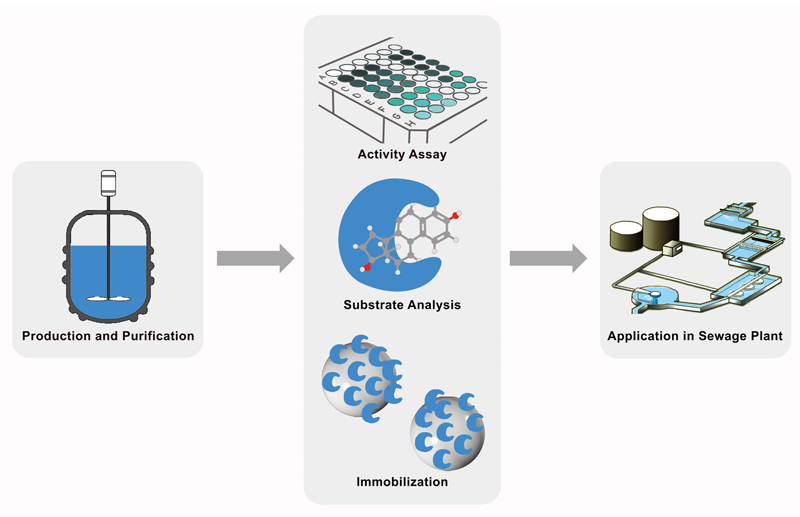Team:Bielefeld-Germany/Judging
From 2012.igem.org
Our BioBricks
<groupparts>iGEM012 Bielefeld-Germany</groupparts>
Datapage
How our BioBrick works

Data for our favorite new parts
- <partinfo>K863000</partinfo> - bpul (laccase from Bacillus pumilus) with T7 promoter, RBS and His-tag: This part is used to overexpress the laccase bpul for further purification followed by characterization of enzyme activity and substrate specificity.
- <partinfo>K863005</partinfo> - ecol (laccase from E. coli) with T7 promoter, RBS and His-tag: This enzyme is overexpressed after induction and can be purified by His-tag. Subsequently the laccase can be characterized regarding to enzyme activity and substrate specificity.
- <partinfo>K863204</partinfo> - shuttle vector pECPP11JS for site-directed recombination of genes of interest in yeast: With this part the production and secretion of a protein of interest like laccase is possible.
We have also characterized the following parts
- <partinfo>BBa_K863012</partinfo> - tthl laccase (from T. thermophilus) with constitutive promoter J23100, RBS and His-tag: This part is used for the constitutive expression of tthl for further purification followed by characterization of enzyme activity and substrate specificity.
- <partinfo>BBa_K863022</partinfo> - bhal laccase (from Bacillus halodurans) with constitutive promoter J23100, RBS and His-tag: This part is used for the constitutive expression of bhal for further purification followed by characterization of enzyme activity and substrate specificity.
Judging criteria
Bronze criteria
Registration of our team
Judging form completed
Team Wiki constructed
Presentation of a poster and a talk at the iGEM Jamboree
Either one new submitted and highly-documented standard BioBrick Part or Device, or a new application of and outstanding documentation of an already existing BioBrick part in the “Experience” section of that BioBrick’s Registry entry.
Silver criteria
In addition to the Bronze criteria...
- Demonstrate that at least one new BioBrick Part or Device of your own design and construction works as expected
- Characterization of the operation of at least one new BioBrick Part/ Device and enter this information in the “Main Page” section of that Part’s/Device’s Registry entry.
Gold criteria
One or more of the following aspects in addition to the Bronze & Silver criteria...
- Improve the function of an existing BioBrick Part or Device (created by another team or your own institution in a previous year) and enter this information in the Registry (in the “Experience” section of that BioBrick’s Registry entry), and don't forget to create a new registry page for the improved part.
- Help another iGEM team by, for example, characterizing a part, debugging a construct, or modeling or simulating their system.
- Outline and detail a new approach to an issue of Human Practice in synthetic biology as it relates to your project, such as safety, security, ethics, or ownership, sharing, and innovation.
Collaboration
Collaboration with the iGEM Team from University College London
We started collaboration with the iGEM Team University College London. They also work with a laccase, the laccase from E. coli W3110. So we had good requirements to characterize each other’s laccases with the different methods we used to characterize the proteins. Therefore we sent our part <partinfo>BBa_K863005</partinfo> and got the part <partinfo>BBa_K729006</partinfo>. In our experiments we showed that their laccase is expressed and active using our activity test with ABTS.
For more detailed information about the methods we used for characterization and the results have a look on the Result Page or the entry in [http://partsregistry.org/Part:BBa_K729006:Experience Parts Registry].
Collaboration with the iGEM team from the Southern University of Denmark
We invited the iGEM Team from the Southern University of Denmark to Bielefeld to share and exchange knowledge and of course to meet another iGEM team. Furthermore they supported us on our event Street Science. You can find all information about our meeting here.
Collaboration with the TU Munich and the UCL London
| 55px | | | | | | | | | | |
 "
"







